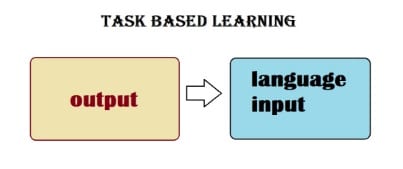Which Phase Of The Lessons Learned Process Produces Observations
An arroyo to pedagogy English: job-based learning

Autonomously from the more traditional PPP (Present, Do, Produce) approach in that location is a groovy number of different methods and approaches to teaching ESL. 1 of subcategories of chatty language teaching is TBL (chore-based learning). Although information technology has been used for many years, its popularity has dramatically increased in contempo years. This article presents an overview of this approach.

Van den Branden defines job-based language learning as "an arroyo to language educational activity in which students are given functional tasks that invite them to focus primarily on meaning exchange and to use language for real-globe, non-linguistic purposes". In other words, TBL refers to an approach to teaching and learning which views the completion of meaningful tasks through authentic communication every bit an constructive way to improve language proficiency in the natural, practical, and functional use. Task-based language learning and pedagogy give students something real to do using the linguistic communication they are learning. Such tasks can include visiting a doc, planning a tour, conducting an interview. Assessment is primarily based on task outcome rather than on accuracy of prescribed language forms, therefore there is no prior focus on language. This makes TBLT especially popular for developing target linguistic communication fluency and educatee confidence.
What are the advantages of TBL?
1. The focus of the learning process moves from a teacher to students. Students themselves make up one's mind on the content of the task and they are free of linguistic communication control. The role of the students is far from being one of the passive recipients of comprehensible input; students are at present seen to accept the leading role in their own learning, learners are autonomous to negotiate course content or to cull linguistic forms when performing a task. Teachers but address students' needs and interests past becoming facilitators / guides.
2. Information technology tin bring pedagogy from abstract noesis to real world application, a natural context. It promotes real communication or the exchange of meanings rather than linguistic forms.
3. It gives the pupil a different way of agreement linguistic communication as a tool instead of equally a specific goal.
4. It is a strong communicative approach where students spend a lot of time communicating.
v. TBL involves many unlike skills and knowledge.
half dozen. Information technology brings a variety to your lessons and motivate students greatly.
What are the disadvantages of TBL?
1. Potentially unpredictable equally it is incommunicable to plan 100% what language the students will use during the task, therefore the teacher should be very flexible.
2. Time-consuming. Doing a task might extend over longer periods of time, more than just one lesson. If you want your students to make a poster or a video, they will accept to do after the lesson in their free time.
A framework of a TBL lesson

Pre-task
In the pre-task, the teacher introduces the topic, gives instructions and presents what will exist expected of the students in the task phase.
Skehan distinguishes between the 'weak' and 'strong' versions of TBLT approach. In weak end version a model of the task is shown earlier the students do it, the teacher may assist the students to recall some key vocabulary or grammatical constructions. Moreover, teachers may present a model of the task by doing it themselves or by presenting pictures, audios, or video demonstrating the job. This gives the students a clear model of what will be expected of them. In «strong» task-based learning lessons, learners are responsible for selecting the advisable linguistic communication for any given context themselves.
Chore wheel
- According to Willis, the most of import is to choose a meaningful chore which is related to real earth activities. It should provide an opportunity to commutation data with a focus on meaning and accept a clear purpose (students know the outcome they are expected to produce). The students complete a task in pairs or groups.
Example of a job:
Your form wants to organise a sightseeing tour for foreign students. With your partner (in a group) make a map with interesting places in your city. Exist fix to explain why you lot've chosen these places. - Then students program how they are going to written report it to the residuum of the class or to other groups. They prepare a short oral or written written report, it might be a short speech communication, a video or a poster. Students can also practice their speaking before reporting the job, therefore, they feel more than confident. The teacher'due south role is typically limited to an observer, they monitor, observe and clear up whatever language questions students may have.
- As a report students requite a presentation of the task, exchange written reports, compare results and and so on. The teacher chooses the order of when students will present their reports and may give the students some quick feedback on the content.
Language focus
- The instructor attracts students' attention to some patterns, vocabulary, grammer that emerged during the report or gives input on the 'gap' between what language the students used and the linguistic communication which would be more than relevant in the chore. They hash out and analyse the linguistic communication.
- Then the teacher conducts exercise of new language depending on the needs of the students. The students then do practise activities to increase their confidence and brand a annotation of useful language.
TBL lesson demo:
The teacher uses a job based approach to present the use of Passive Vox.
Task-based lesson on speaking:
A dark out
As Jane and Dave Willis say the "the best mode to learn virtually TBL is to Exercise it."
Promise yous will savour TBL lessons. If you have already tried this arroyo, please write about your experience in comments.
Source: https://skyteach.ru/2018/04/20/an-approach-to-teaching-english-task-based-learning/
Posted by: gibbonsnamonsiver.blogspot.com



0 Response to "Which Phase Of The Lessons Learned Process Produces Observations"
Post a Comment